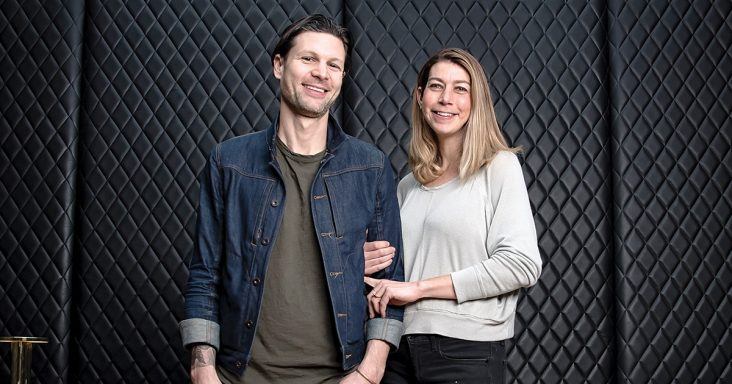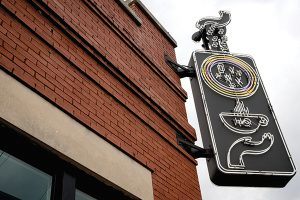Onyx Coffee Lab heads to The 1907 in downtown Rogers
by April 14, 2019 3:31 pm 8,022 views

Jon and Andrea Allen, owners of Onyx Coffee Lab, are moving their roastery operations and coffee school into The 1907, a renovated 30,000-square-foot building in downtown Rogers.
The 110-year-old red brick building at 101 E. Walnut St. in downtown Rogers has come full circle.
Originally built in 1907 as Rogers Wholesale Grocery, it will open within the month as The 1907 and will house a handful of restaurant-related businesses, anchored by Onyx Coffee Lab, a wholesale coffee business.
Jon and Andrea Allen, owners of Onyx Coffee Lab, along with a group of local developers are behind the approximately $4 million project.
The 30,000-square-foot building will be home to Onyx Coffee Lab’s roastery operations and coffee school. The Onyx café will have seating for 100 inside and 40 on the patio. Doughp, a wholesale and catering bakery run by chefs Sammy Townsend and Justin Calvert, will supply baked goods.
Chef Jason Paul’s The Heirloom At 1907 will offer intimate dinners for around 20 people in a private room on the mezzanine level of the building. The Foreman, an upscale cocktail bar with seating for 40, is also on the mezzanine. Dry Storage is the name of the event space for a possible dinner series or concerts and can also be rented for private events.
Yeyo’s Mexican Grill will offer specialty tacos with indoor and patio seating in a 1,000-square-foot space on the North First Street side of the building, with a planned opening of late May or June. Eleven one-bedroom loft apartments, already fully leased, round out the building.
In moving their production from Springdale, the Allens wanted a building large enough to house their full-scale roastery, which employs 12 people, and that would allow the roastery to be visible to the public. The 2,500-square-foot roastery at The 1907 will be on full view and will increase roasting output seven to eight times from current capacity to 10,000 pounds of coffee a week. A “cupping” room is located on the mezzanine, where Onyx’s quality control team will taste 60 to 80 coffees a day. Inventory storage, offices and the coffee school will be in the basement.
Jon Allen said that because the building includes so many different elements, getting state approval was difficult. “[The state] didn’t really understand how to reconcile manufacturing, alcohol, retail, restaurant, residential,” he said. “Even having open manufacturing [with the public roaster], in a way, broke the rule book. The state didn’t understand why someone would want to do it.”
On the other hand, the city of Rogers didn’t have “preconceived notions about what a good business is,’” Jon said. “Their attitude was, ‘If you think it’s going to work and you’ve been successful in the past, why don’t you go for it, and we’ll help you out in any way possible.’”
BUSINESS MODEL
The Allens started Onyx in 2012 with the goal of having “the best coffee in the world,” as well as a business model of “transparency, education, high-end quality coffee and treating each person along the way with kindness and respect,” Jon said.
Onyx, which inventories 12 to 20 bags of coffee at a time ranging in price from $15 to $100, is one of the only coffee roasters that is transparent about where its coffee is sourced, what it pays for it and how the coffee is “scored” (the quality of it). That information is published on its website, Jon said. Onyx pays an average of three times more than fair trade for its green coffee, which is sourced in east Africa and South and Central America.

“Other companies say they buy ethical coffee, but that is up to whatever they say it is. There’s no data behind it,” Andrea said. “We will actually show people what we pay.”
Since coffee is not grown in the United States, educating the public about the human element behind how it is sourced and paying a good wage for it is important to the Allens.
“You can’t buy a coffee for a dollar and not think that someone across the world is getting taken complete advantage of,” Jon said. “It’s too hard a crop to grow, ship 10,000 miles away and have a café or diner make a cup of coffee without knowing they paid pennies for that coffee. There’s an entire people group in every coffee producing country that’s been in cyclical debt and hunger for the last 50 years because of cheap coffee.”
Paying coffee producers in full when product is received is also key for the business. “We’re the only company we know of that does that,” Andrea said.
Because they want to be the ones who decide what is right for their business, the Allens haven’t taken on investors for Onyx. Jon said the couple wants to be able “to invest a million dollars” into a cafe or buy coffee at $100 a pound if that’s what they feel is best.
A low debt load is also key. “Part of that is a stress level and an ethos we’ve developed. We want to make sure we have the capital to run our business, including paying all our staff and giving raises,” Andrea said.
DISTRIBUTION AND GROWTH
About 90% of Onyx’s business is online through coffee subscriptions and ordering, relying heavily on Instagram for advertising. The wholesale business supplies 500 shops throughout the United States, as well as 50 locations across Asia, Australia, Canada and Europe. Approximately 90% of what they roast leaves the state of Arkansas.
“Our core business is roasting for high-end cafes in San Francisco and Hong Kong and wherever,” Jon said.
The coffee is better known on the West Coast than in Arkansas, and people moving to Bentonville from San Francisco come to the shop because they knew and loved Onyx coffee there, Jon said.
The multimillion-dollar business, which has 82 employees, grew retail store revenue 30% and wholesale revenue 200% in the past year.
“The quality of our coffee, our transparency and then the coffee competitions” have been key to growth, Jon said. “I can’t explain how hard it is to be a roaster from Arkansas. It’s a hard sell until the competitions get going.”
Winning Roaster of the Year in 2017 and placing in competitions at the U.S. Coffee Championships for the past four years has given the company name recognition.
While the couple wants to have a café in each of Northwest Arkansas’ largest downtowns, wholesale business is the main goal because it is more profitable, Jon said. “Coffee tourism” will come with the new roastery in downtown Rogers, he believes.
“We already have that in Bentonville,” Jon said. “Coffee enthusiasts will drive hours to come hang out and try specialty coffees.”
Specialty coffee has a “huge growing enthusiast base,” Andrea said, and that base is willing to pay more. Jon noted they recently made available a Columbian coffee at $100 for a 12-ounce bag online. “It sold out in 12 hours,” he said.
According to the Specialty Coffee Association, the retail value of total coffee in the United States was between $79 billion and $80 billion last year, and 56% was specialty coffee. The latte is the most popular drink, with more than 67 million ordered in the United States in a year’s time.
“Coffee is the fastest growing culinary product,” Jon said. “It’s big business.”
He cites The Coca Cola Company’s $5.1 billion purchase of the Costa coffee shop chain, which has 4,000 stores across 32 countries. Nestle also recently paid $500 million for Blue Bottle, a roastery and coffee shop chain in California, New York, Washington, D.C., and Tokyo.
Whether it’s hometown folks or tourists, the Allens hope the newest business will be an “experience.” They envision The 1907 as a home for local people to gather and enjoy fresh pastry and coffee, while also being a place for those in the coffee industry or enthusiasts who are serious about learning and tasting the best coffees in the world, Jon said.
